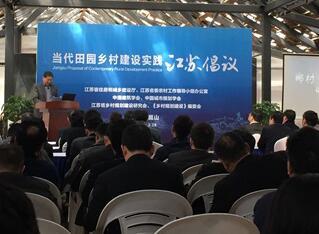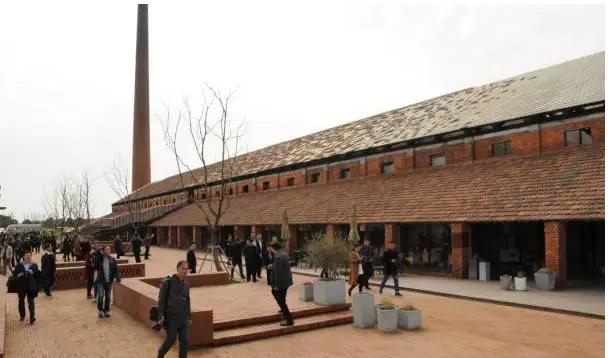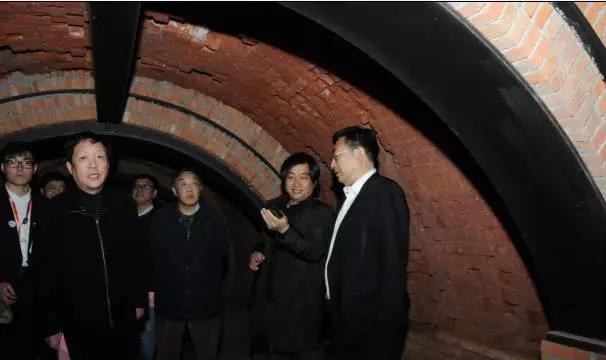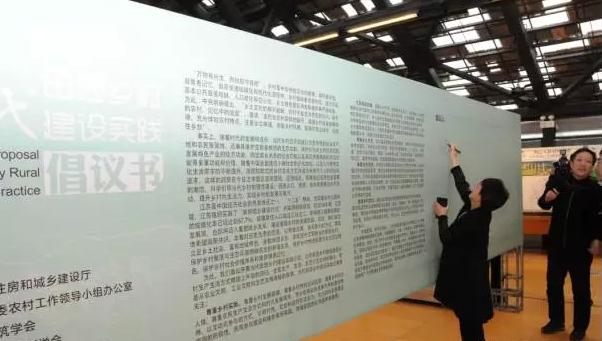The waste brick kiln factory has turned into a "beautiful village" like a literary coffee shop, which is right around you.

The Symposium on the practice of Contemporary Rural Planning and Construction was held in Jinxi Town, Kunshan City, Suzhou. During the meeting, Zhang Xueqin, director of the Village and Town Construction Department of the Ministry of Housing and Urban-Rural Development, Zhou Lan, director of the Department of Housing and Urban-Rural Development of Jiangsu Province, and other leading comrades, together with all the representatives attending the meeting, went to Zhudian Village for on-the-spot visits.
The restored brick kiln ruins and pastoral scenery reflect each other, the new rural form is fresh and fresh, and the rural living environment has been significantly improved, all of which have left a deep impression on the reporters at the intersection.
The participants also jointly signed the proposal on the practice of Contemporary Pastoral Rural Construction, advocating the joint participation of government departments, professional scholars and grass-roots units to jointly promote the planning and construction of contemporary beautiful rural areas.

Zhudian Brick Kiln Culture Center
Exploration and attempt on the Reconstruction of China's New Countryside in Jiangnan Village
In Zhudian Village, Jinxi Town, Kunshan City, a towering red brick chimney comes into view, and further ahead is a revamped brick kiln factory-Zhudian Brick Kiln Culture Center. The thick brick kiln culture contrasts with the light and ingenious characteristics of the water village, which was nothing but ruins a few years ago.
The saying "36 bridges and 72 kilns" has been circulating in the local area. Small bridge and flowing water and the Red Brick Kiln Factory have become the childhood memories of many people. However, with the development and changes of the times, the brick kiln factory slowly withdrew from the historical stage, leaving sites large and small. Local villagers explained that the brick kiln factory at the entrance of the village was built in 1981 and was later abandoned. It was originally intended to be torn down and prepared for directional explosion.
"guarding the countryside and leaving nostalgia should be the bottom line of the evolving rural construction." Cui Xun, academician of the Chinese Academy of Engineering, is the project designer of Zhudian Brick Kiln Culture Center. In his view, this "anachronistic" site not only condenses the memories and sweat of the local people for more than 30 years, and protecting it is the best preservation and respect for history.
After transformation, the first floor of the Zhudian Brick Kiln Cultural Center is mainly used as small theme classes and public open spaces such as cultural bazaars, study rooms and coffee roasting in kilns. Tourists are often attracted by elegant and exquisite brick and wood handicrafts. The second floor is the brick culture exhibition area, large conference area and related functions, creating a relaxed indoor environment between light and shadow, allowing people to slowly taste the rural charm.
The transformation of a brick kiln has awakened the local people's memories of the countryside and has become a bridge over the cultural fault. In this way, in a small village in the south of the Yangtze River, the transformation of China's new countryside on the premise of protection began to explore and try.

Interior of brick kiln factory
To keep nostalgia, more than 600 design masters are in action.
The premise of keeping nostalgia is to retain culture and beauty, and the vast countryside is the best space to carry nostalgia. In September 2011, Jiangsu launched the "Beautiful Urban and Rural Construction Action", actively exploring to promote the integration of urban and rural development, planning and building a "beautiful countryside".
In order to systematically understand the current rural situation and farmers' wishes in Jiangsu Province, in September 2011, the Housing and Construction Department of Jiangsu Province took the lead in organizing more than 600 designers and related experts to carry out a systematic rural survey in the province. The investigation provides a decision-making basis for village renovation. Over the past 15 months, the investigation team traveled 54617 kilometers across Jiangsu, interviewed 6411 people, drew and took more than 5500 pictures, investigated people, culture, land, property, and scenery, and understood the problems that farmers were most concerned about, most urgent, most urgently needed, and benefited the widest range of benefits. priority should be given to solving the problems that farmers strongly reflect, such as domestic garbage, village roads, river pond water system, tap water, etc., rather than large-scale demolition and construction, and face-saving projects.
"this is also the most extensive and promoted special rectification action in Jiangsu's history, and it has the characteristics of universal benefit, practicality, locality, and foresight." Liu Dawei, deputy director of the Department of Housing and Urban-Rural Development of Jiangsu Province, said that Jiangsu environmental renovation covers nearly 190000 natural villages in the province, and has promoted the "five-in-one" of economy, society, culture, politics and ecology through construction. in the 2015 survey of people's satisfaction with the construction of ecological civilization in Jiangsu Province, the satisfaction rate of village environmental renovation reached 88.8%, ranking in the forefront of the survey results. This rural action, which was originally initiated and promoted by the "top-down" government, finally became a "bottom-up" practice of improving the living environment of the village supported by the farmers.

Sign the proposal for the practice of Contemporary Pastoral Rural Construction
Rural rejuvenation urgently needs the participation of the whole society.
"Jiangsu has done a lot of work around rural construction during the 12th five-year Plan period, which is more based on improving the dirty and messy environment in rural areas, but has not yet risen to the improvement of the material environment to promote rural revival." Zhou Lan, director of the Provincial Department of Housing and Construction, said frankly that although the rectification starts from the material environment, it is a catalyst and a starting point for rural improvement, objectively promoting the flow of social resources to the countryside, such as the rise of rural tourism around Nanjing and Suzhou.
Yang Yayun, a native of Zhudian Village and a "post-80s" entrepreneurial young woman, ran an advertising media company in Shanghai a few years ago. Gratifying changes have taken place after the transformation of her hometown. She decided to reduce the volume of business in Shanghai. Return to the village to continue to start a business, and actively participate in rural reconstruction, "after coming back, although the income decreased, but in this beloved land." You can enjoy the time with your family and contribute to the construction of your hometown. "
"We also realize that rural construction must be a comprehensive revival of rural society and requires the participation and help of the whole society. that is why we have this" initiative ", which calls on people from all walks of life to gradually improve and participate in the way of pluralistic participation. participate in the construction of contemporary pastoral rural construction based on local society, bearing pastoral nostalgia and reflecting modern civilization." Zhou Lan believes that the revival of rural society needs a process, which must rely on the play of the main body of farmers. In this process, the competent departments and academia are only promoters and helpers, not instead of farmers' decision-making. The essence of rural renewal is not top-down, but bottom-up.
In this year's "Government work report," Premier Li Keqiang explicitly called for "building beautiful villages with both modern civilization and pastoral scenery." the 13th Party Congress of Jiangsu Province also proposed to "speed up the construction of beautiful and livable villages. Efforts should be made to cultivate a number of beautiful villages with characteristics." this "initiative" can be said to be an echo of the requirements of the state and the provincial party committee and provincial government. At the same time, it also reflects that the values of the industry are no longer simple and administrative, but emphasize that all relevant people work together to reshape the beauty and value of the countryside, and attract young people to return home. In this way, the future main structure of the countryside has changed. The role of subjective consciousness will be better.
Important Notice :
前街咖啡 FrontStreet Coffee has moved to new addredd:
FrontStreet Coffee Address: 315,Donghua East Road,GuangZhou
Tel:020 38364473
- Prev

Representatives of Starbucks Coffee Co., Ltd. visited Weiyang District.
On the morning of March 30, responsible persons of Chengdu Starbucks Coffee Co., Ltd. and Xi'an Starbucks Coffee Co., Ltd. visited Weiyang District at the gracious invitation of District leaders and District Economic and Trade Bureau. The Starbucks inspection team listened to Liu Lei, deputy director of the District Economic and Trade Bureau, introduced the development of the business district in Weiyang District, and visited Sheng Longguang on the spot.
- Next

Pu'er Coffee sings "the Story of time"
I'm not exaggerating this coffee. It's the best coffee I've ever had in every country all over the world. At the Foreign Ministry's Yunnan global promotion meeting last month, this good drink approved by Foreign Minister Wang Yi is Yunnan coffee. This commendation makes the coffee people in Pu'er City, which ranks first in the province in terms of coffee planting area, output and output value, full of joy. They drummed and shouted for Pu'er coffee.
Related
- What grade does Jamaica Blue Mountain No. 1 coffee belong to and how to drink it better? What is the highest grade of Blue Mountain coffee for coffee aristocrats?
- What are the flavor characteristics of the world-famous coffee Blue Mountain No. 1 Golden Mantelin? What are the characteristics of deep-roasted bitter coffee?
- Can I make coffee a second time in an Italian hand-brewed mocha pot? Why can't coffee be brewed several times like tea leaves?
- Hand-brewed coffee flows with a knife and a tornado. How to brew it? What is the proportion of grinding water and water temperature divided into?
- What is the difference between Indonesian Sumatra Mantinin coffee and gold Mantinin? How to distinguish between real and fake golden Mantelin coffee?
- What does bypass mean in coffee? Why can hand-brewed coffee and water make it better?
- Unexpected! Ruixing Telunsu lattes use a smoothie machine to foam milk?!
- % Arabia's first store in Henan opens into the village?! Netizen: Thought it was P's
- Does an authentic standard mocha coffee recipe use chocolate sauce or powder? Mocha Latte/Dirty Coffee/Salty Mocha Coffee Recipe Share!
- What is the difference between Vietnam egg coffee and Norway egg coffee? Hand-brewed single product coffee filter paper filter cloth filter flat solution!

